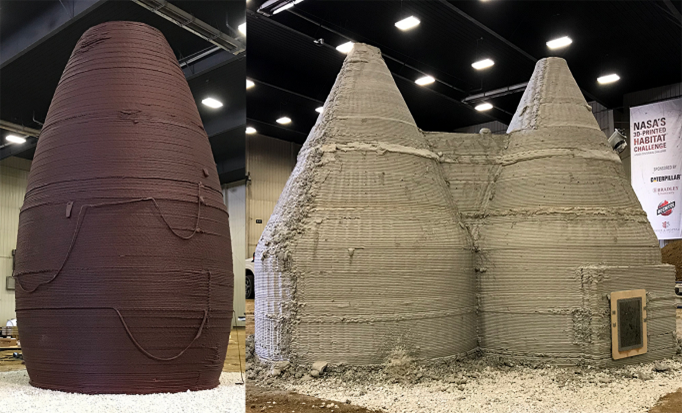Since 2015, NASA and its partners have held a $3.15 million competition to build a 3D printed habitat for deep space exploration, including the agency’s journey to Mars. The multiple phases of the competition involved more than 60 teams, and NASA has awarded more than $2 million to encourage the development of innovative solutions. Bechtel has been a co-sponsor of the competition along with Bradley University, Caterpillar, Brick & Mortar Ventures, and the U.S. Army Corps of Engineers.
Phase 1, completed in 2015, focused on design concepts that take advantage of 3D printing capabilities. In Phase 2, the Structural Member Competition, teams competed in the use of the technologies needed to fabricate structural components with materials like those that might be found on the moon, or Mars, or a combination of indigenous materials and recyclables. For the final level of Phase 2, competing teams produced 3-D printed structural components, including beams, cylinders, and a dome, following rules set forth by a panel of judges who are industry experts. Principal judge Pete Carrato, a retired Bechtel Fellow, created the design for all the teams to follow as they printed their domes.
The final phase of the Mars 3D Printed Habitat challenge culminated in a head-to-head construction competition at Caterpillar’s Edwards Training Facility in Edwards, Illinois. Teams used 3D printing with recyclable materials, materials that are abundant on Mars and the moon, and indigenous material simulants to create shelters at one-third scale of the design. The two teams used different material that required different printing processes. AI Space Factory used a material that was a combination of a polymer (PLA) and basaltic fibers. This thermal setting material required a relatively slow printing process. Penn State used a custom blended cement-based material.
The competition lasted four days and involved 30 hours of 3D printing operations employing robotic technology to minimize the need for human intervention. Judges assessed the completed structures for strength, leakage, durability, and evaluated the performance of the fully automated robots. The winning team, AI Space Factory, was awarded $500,000, and the Pennsylvania State University second-place team received $200,000. 
The two completed structures are show above, Penn State (approximately 12.4 feet tall) on the right and AI Space Factory (approximately 14 feet tall) on the left.
Bechtel’s co-sponsorship of the competition aligns with the organization’s strategy to develop innovative concepts, approaches, technologies, and tools through internal development as well as external partnerships. Resulting in improved efficiency, productivity, and safety of today’s projects as well as expanding the realm of possibility for infrastructure in the future. We’re excited to be a part of an initiative that is propelling the industry forward on earth, and beyond.
Image Credit: NASA/MSFC/Emmett Given

